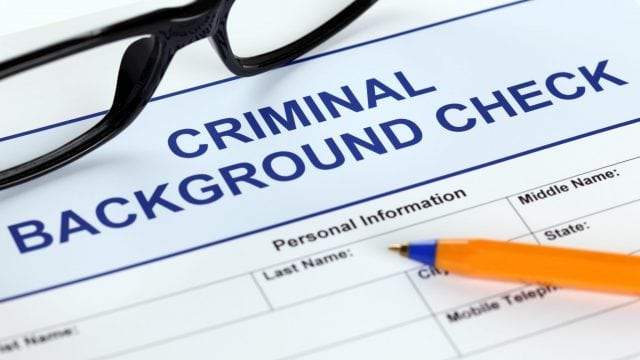 Figuring out whether or not disclosure of expunged records to New Jersey Board of Nursing (BON) is required can be stressful. The New Jersey expungement attorneys at Katherine O’Brien Law, however, work directly with individuals who are either enrolled in nursing school or contemplated becoming nurses or who are otherwise in the process of applying for licensure. We can therefore help guide you through the process.
Figuring out whether or not disclosure of expunged records to New Jersey Board of Nursing (BON) is required can be stressful. The New Jersey expungement attorneys at Katherine O’Brien Law, however, work directly with individuals who are either enrolled in nursing school or contemplated becoming nurses or who are otherwise in the process of applying for licensure. We can therefore help guide you through the process.
All Registered Nurses and Licensed Practical Nurses in New Jersey are required to undergo a criminal background check as part of the licensure process. As part of that processes, you will be asked to answer the following questions:
-
Have you ever been summoned; arrested; taken into custody; indicted; tried; charged with; admitted into pre-trial intervention (P.T.I.); or pled guilty to any violation of law, ordinance, felony, misdemeanor or disorderly persons offense, in New Jersey, any other state, the District of Columbia or in any other jurisdiction? (Parking or speeding violations need not be disclosed, but motor vehicle violations such as driving while impaired or intoxicated must be.)
-
Have you ever been convicted of any crime or offense under any circumstances? This includes, but is not limited to, a plea of guilty, non vult, nolo contendere, no contest, or a finding of guilt by a judge or jury.
-
Are there any criminal charges now pending against you in New Jersey, any other state, the District of Columbia or in any other jurisdiction?
In determining whether or not you should disclose your criminal history to the BON, the following issues should be addressed.
Was Your Record Actually Expunged?
The first question to ask yourself in determining whether or not you should disclose your criminal history is whether or not your criminal history was in fact expunged. Do not guess here. You need to be absolutely certain that your record was successfully expunged. If you fail to disclose your criminal record to the BON on the basis that you were operating under the mistaken impression that your criminal history was expunged — when it in fact was not — you may very well subject yourself to disciplinary action with the BON. Ignorance is not an excuse here.
Often times, people assume that after a certain period of time their criminal records will eventually just go away, or become “expunged” in New Jersey. This is simply not the case. In order to obtain an expungement in New Jersey, you need to actually file a Petition for Expungement with a Superior Court in New Jersey. Records do not just expunge themselves — regardless of what your prior attorney or anyone else tells you.
At the end of the expungement process, you should have been given an Order of Expungement, which would have been signed by the Judge that granted to your expungement, as well as a letter from the New Jersey State Police confirming that your records were deleted from the relevant databases in accordance with the Order of Expungement. If you do not have this supporting documentation, do not just assume that your record has been expunged.
If you are unsure of whether your record was actually expunged, you should find out. You can do so by asking the attorney that represented you on the matter. Alternatively, you can also perform an FBI criminal background check on yourself.
If Your Record Has Not Been Expunged
If, after inquiry, you arrive at the conclusion that your record has not been expunged, then you must disclose it in response to questions 14, 15, and 17, as applicable. Failure to do so will result in disciplinary action and could even prevent you from being able to obtain a license.
For example, in a recent BON disciplinary action, an applicant answered “no” to questions 14 and 15 on her license application. Her background check results, however, revealed that she had been arrested and charged with theft in 1999, for which she was sentenced to three years of probation. After the BON contacted the applicant with the results, the applicant explained that she answered “no” in response to questions 14 and 15 because the case was closed after she paid the judgment in full, thus leading her to believe that the case was no longer on her record. The BON, nonetheless, concluded that the applicant “used dishonesty, deception, or misrepresentation in not disclosing her arrest and conviction on her application form and criminal history background check, which constitutes a violation of N.J. S.A. 45:1-21(b) .”
Although the BON in that matter publicly disciplined the applicant and imposed a civil monetary penalty against her, such conduct could have resulted in the BON’s refusal to admit the applicant to sit for the NCLEX or to issue her a license. This is because, pursuant to N.J.S.A. 45:1-21(b), entitled “Refusal to License or Renew, Grounds:”
A board may refuse to admit a person to an examination or may refuse to issue or may suspend or revoke any certificate, registration or license issued by the board upon proof that the applicant or holder of such certificate, registration or license:
. . .
(b) Has engaged in the use or employment of dishonesty, fraud, deception, misrepresentation, false promise or false pretense . . . .
[N.J.S.A. 45:1-21(b).]
If Your Record Has Been Expunged
If you conclude that your record was successfully expunged, figuring out whether or not you should disclose the record to the BON becomes a bit more complicated. The issue is perhaps better phrased as must you disclose the expunged information vs. should you disclose the record?
Technically speaking, you are under no legal obligation to disclose the expunged record. Once a record is expunged in New Jersey, the offense is “deemed not to have occurred, and the petitioner may answer any questions relating to their occurrence accordingly.” See N.J.S.A. 2C:52-27. This statute, however, goes on to list three exceptions to this general rule. The three exceptions under which expunged records must nonetheless be disclosed are as follows:
- If the petitioner subsequently applies for another expungement;
- If the petitioner subsequently applies for acceptance into a diversionary program in New Jersey courts; or
- If the petitioner is seeking employment within the judicial branch or with a law enforcement or corrections agency.
Thus, according to the New Jersey expungement statutes, applications to obtain professional licenses (other than to practice law) need not recite court proceedings that have been expunged. Thus, nurses are technically under no legal obligation to disclose the expunged record to the BON.
Practically speaking, however, disclosure may nonetheless be recommended. Even if your criminal record was expunged, the BON will most likely still be able to see it. In fact, after calling the New Jersey Board of Nursing and asking them this question directly (i.e., whether or not nursing applicants were required to disclose expunged information), we were advised that, yes, nursing applicants should disclose even expunged information on the application. When we inquired into the reason for this, we were advised that applicants should disclose expunged offenses since those matters will most likely be revealed on the applicant’s criminal history report in any event.
In short, although you would not be subject to any disciplinary action for failure to disclose the expungement offense, our advice is that, even if the matter was expunged, since you can expect the arrest to be included in your criminal history report, it is probably best to disclose the information with an explanation of the event, the circumstances surrounding it, and proof of expungement.
Why Even Bother With Expungement Then?
After reading this article, you might be wondering whether it even makes sense to bother applying for an expungement at all since the BON will likely see the expunged offense anyway. It is absolutely imperative, however, that you have a clean record as a nurse.
First, if your record is not expunged, the BON can (and will) disqualify you from being eligible for licensing. Once your record is expunged, however, the BON is precluded from disqualifying or discriminating against you on the basis of the expunged information. See N.J.S.A. 2A:168A-3. Thus, expungement prevents the BON from using the criminal records against you when it comes to granting your license. Second, once you are licensed, the background check process is not over. Whenever you apply for a position of employment with a hospital, nursing home, clinic, etc., the potential employer will most likely conduct their own background check. Thus, you will obviously want to have a clean record for this reason as well.
For more information on expungements, read our blog post on Expungements for Nurses and Nursing Students in New Jersey.
Experienced, Affordable Expungement Lawyers
If you have any questions about the disclosure of expunged records to the New Jersey Board of Nursing, contact the lawyers at Katherine O’Brien Law today at 856-832-2482. Our affordable expungements start at only $895.00 (all inclusive). We also offer flexible payment plans and can start working on your case for as little as $350.00 down.







